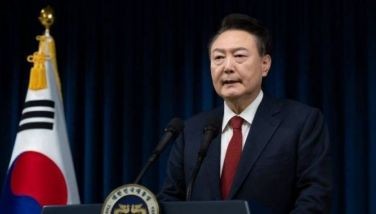Cellphone operator wades into surveillance debate
NEW YORK - Wireless carrier Vodafone Group PLC is performing a tricky balancing maneuver by publishing a report on government surveillance of its subscribers in 29 countries — a release that reveals more than first meets the eye.
In the report published Friday, Vodafone, which has unparalleled global reach for a cellphone company, said six countries have demanded direct access to its network. That cuts Vodafone's employees out of the surveillance process, removing one of the hurdles that can curb government overreach.
Vodafone would not say which countries have established these direct links. But in an exhaustively researched appendix to the report, the U.K.-based company sheds light on the legal frameworks that surround government interception in the 29 countries. The appendix reveals that six countries — Albania, Egypt, Hungary, Ireland, Qatar and Turkey — have provisions that allow authorities to request unfettered access.
In two other countries, India and the U.K., legal provisions are unclear as to whether government officials are allowed to have direct access, according to the report.
The report is remarkable not so much for what it reveals about the extent of law enforcement and intelligence agency surveillance, but for the comparisons it enables across countries. The report also highlights six countries for which Vodafone was unable to disclose any statistics on warrants from the government or other requests: Romania, Qatar, Egypt, India, South Africa and Turkey.
By contrast, Vodafone's report is almost superfluous for some Western European countries, like Germany, where the government already publishes statistics on how many requests it sends phone companies.
Wiretapping of phones and accessing of call records for law-enforcement purposes is a decades-old and accepted practice even in the most open democracies. With backing from courts, police can request cooperation from phone companies to access communications.
But in developing countries like Congo, Ghana and Lesotho, Vodafone doesn't have the capability to support wiretapping, since governments haven't requested it.
By making its report public, together with a disclosure of requests for information, Vodafone is entering the international debate about balancing the rights of privacy against security. Rather than being stuck with responsibility and backlash when citizens realize their data has been scooped up without their knowledge, Vodafone decided it was time to push for a debate.
Vodafone's report comes one year after former NSA systems analyst Edward Snowden revealed that US and other countries' intelligence agencies indiscriminately gather and store huge amounts of data from phone calls and Internet communications.
"Companies are recognizing they have a responsibility to disclose government access," Daniel Castro, senior analyst for the Information Technology and Innovation Foundation in Washington. "This is new."
Vodafone's report is also seen by some as an effort to turn the page on the company's embarrassing role in the protests that toppled Egyptian strongman Hosni Mubarak in 2011. As the protests raged, the government forced Vodafone to bombard its Egyptian subscribers with propaganda text messages. The company said it had no choice but to comply, but was severely criticized for its actions.
"They took a hard lesson there," said Cynthia Wong, a senior internet researcher at Human Rights Watch. "Even if the government is the ultimate problem, they realized they needed to take steps to mitigate harm to their users."
Civil liberties advocates applauded Vodafone for releasing the report and cracking open the debate, even as they expressed alarm at the infringements into civil liberties.
"For governments to access phone calls at the flick of a switch is unprecedented and terrifying," said Shami Chakrabarti, director of the human rights group Liberty, adding that the Snowden revelations showed the Internet was already being treated as "fair game."
"Bluster that all is well is wearing pretty thin —our analog laws need a digital overhaul," she said.
Civil liberties advocates weren't the only ones applauding Vodafone's actions. Norway's Telenor Group, which also has operations across Eastern Europe and Asia, offered support, noting governments have the ultimate responsibility to act.
In the US, Snowden's revelations focused particular attention on the role of Western technology and telecommunications firms, which stand accused of facilitating the mass surveillance by giving spies unrestricted access to their networks. Several Silicon Valley companies have since attempted to restore consumers' trust by publishing data on government surveillance.
The study comes at a time when other businesses are calling for a revamp of laws too outdated to stand up to the quickly changing telecommunications universe.
Executives in Silicon Valley, for example, have stepped up pressure on President Barack Obama to curb the US government surveillance programs that collect information off the Internet.
Twitter Inc., LinkedIn Corp., AOL Inc., Google Inc., Apple Inc., Yahoo Inc., Facebook Inc. and Microsoft Corp. are pushing for tighter controls over electronic espionage — fearing that eavesdropping threatens the technology industry's financial livelihood.
"They want their customers to be able to trust them to store their data in a private and secure manner," Castro said.
The countries included in the report are: Albania, Australia, Belgium, the Czech Republic, Congo, Egypt, Fiji, France, Germany, Ghana, Greece, Hungary, India, Ireland, Italy, Kenya, Lesotho, Malta, Mozambique, the Netherlands, New Zealand, Portugal, Qatar, Romania, South Africa, Spain, Tanzania, Turkey and the U.K.
- Latest
- Trending































